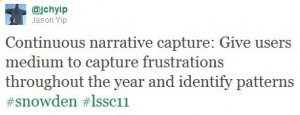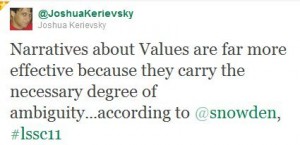In a question on Quora about how a start-up should handle performance reviews, John Lilly writes:
After believing in annual reviews for most of my career, I don’t really believe in them anymore. Not timely enough, demoralizing in general (everyone thinks they’re above average), and just a hell of a lot of work for everyone. This negative view of annual & traditional reviews is quite strongly supported by university research — it’s just counter-productive, even though we all think we should do it.
Tag Archives: org
yearly performance review is out-dated
from an article in Wired by Thomas Goetz, How Facebook Uses Feedback Loops: Meet Rypple.
How does Facebook keep its employees happy? Feedback. Lots and lots of feedback.
….
“Workplace productivity has been stuck to a 50-year-old, paper-based performance-review cycle,” says Daniel Debow, Rypple’s co-founder and co-CEO.….
“Our company has always been built around feedback loops,” says Facebook engineering director Bob Trahan, who counts himself as employee 45. “Everything we do in engineering is reviewed: Engineer A reviews what Engineer B does. We have design reviews twice a week. We track performance metrics for code, in terms of speed and time.”….
The whole process of managing employee performance and providing feedback has been in need of an overhaul for some time. The 360-degree review was popularized in the 1990s
….
“three-sixties” have many limitations, the biggest of which is that they typically happen only once a year.In 2000, Jai Ghorpade, a professor of management at San Diego State University, conducted a review of more than 600 employee feedback studies, only 30 percent of which showed improvements in employee performance. Another 30 percent reported decreases in employee performance after a feedback review, and the rest reported no impact at all. “While it delivers valuable feedback, the 360-degree concept has serious problems relating to effectiveness,” Ghorpade concluded.
mistake to write down values without necessary ambiguity – use stories. @snowded #lssc11
One of the points I made in yesterday’s keynote was that it is a mistake to write down your values, as the act of codification results in their loss. In effect we shift an ideation culture (the way we do things around here that we all understand but can’t really articulate) to an explicit rule based culture. Aside from the fact that I have yet to see a set of organisational values that were not a set of well meaning platitudes, all you are really doing is teaching the politically manipulative the language of power.
….
we need to [articulate values] in a way that carries with it necessary ambiguity so that the statements can adapt to context, and also so that their form allows for verification of actions, not just linguistic form.
Parables, fables, short sayings – often paradoxical in nature, archetypal stories and characters:
…. more pedigree and more sustainability than a few pious banalities on a motivational poster. All of them involve small, pithy and frequently paradoxical stories. The point here is that a story carries context with it, as well as the ability to create resonance. Critically it allows for ethical validation; saying that action X was consistent with a mission statement is easy, matching it against a story is far more difficult.



